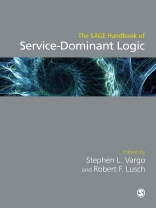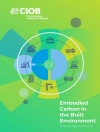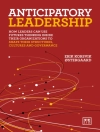Service-Dominant Logic presents a major paradigm shift in thinking about value creation and markets, moving from a ‘goods/product’ logic to a logic that treats the process of service provision as the basis of all exchange, both commercial and social. This timely Handbook brings together chapters written by a stellar cast of expert authors from around the globe, arranged around eleven core themes, to provide a comprehensive overview of key issues, developments, debates and potential future directions for this dynamic field of study:
Part 1: Introduction and Background
Part 2: Value Cocreation
Part 3: Service Exchange
Part 4: Service Ecosystems
Part 5: Institutions and Institutional Arrangements
Part 6: Resources and Resource Integration
Part 7: Actors and Practices
Part 8: Innovation
Part 9: Midrange Theory
Part 10: Selected Applications
Part 11: Reflections and Prospects
This Handbook is an essential reference text for scholars, students, consultants and advanced practitioners across a wide range of business & management practices and academic disciplines.
Mục lục
SECTION 01: Introduction and Background
1. An Overview of Service-Dominant Logic – Robert F. Lusch & Stephen L. Vargo
2. Services in Society and Academic Thought: An Historical Analysis [Reprint] – Stephen L. Vargo & Fred W. Morgan
3. Why Service-Dominant Logic? – Stephen L. Vargo & Kaisa Koskela-Huotari
SECTION 02: Value Cocreation
4. Value Cocreation: Conceptualizations, Origins, and Developments – Janet Mc Coll-Kennedy & Lilliemay Cheung
5. Value Cocreation: An Ecosystem Perspective – Pennie Frow & Adrian Payne
6. The Cocreation of Brands – Hope Schau, Albert M. Muñiz Jr. & Melissa Archpru Akaka
7. The Contextual Nature of Value and Value Cocreation – Anu Helkkula, Apramey Dube & Eric Arnould
SECTION 03: Service Exchange
8. Reframing Exchange: A Service-ecosystems Perspective – Melissa Archpru Akaka & Jennifer Chandler
9. Ethical Foundations for Exchange in Service Ecosystems – Patrick Murphy & Gene Laczniak
10. The Dynamic Context of Service Exchange: Rethinking Service Context from a Performativity Lens – Satoko Suzuki & Yutaka Yamauchi
11. How Service Exchange Drives Market (Re)Formation – Angeline Nariswari
SECTION 04: Service Ecosystems
12. Service Ecosystems: A Timely Worldview for a connected, digital and data-driven economy – Irene Ng & Susan Wakenshaw
13. Systems Behavior and Implications for Service-Dominant logic – Philip Godsiff, Roger Maull & Phil Davies
14. The Study of Service: From systems to ecosystems to ecology – Irene Ng, Paul Maglio, Jim Spohrer & Susan Wakenshaw
15. Service Systems, Networks and Ecosystems: Connecting the Dots Concisely from a Systems Perspective – Javier Reynoso, Sergio Barile, Marialuisa Saviano & Jim Spohrer
SECTION 05: Institutions and Institutional Arrangements
16. Institutions and Institutionalization – Michael Kleinaltenkamp
17. Coordinating Resource Integration and Value Cocreation through Institutional Arrangements: A Phenomenological Perspective – Ingo Karpen & Michael Kleinaltenkamp
18. Institutional Change in Service Ecosystems – Jaakko Siltaloppi & Heiko Wieland
19. Institutional Work for Value Co-creation: Navigating amid Power and Persistence – Jörg Sydow, Olivier Berthod & Markus Helfen
SECTION 06: Resources and Resource Integration
20. Resource Integration: Concepts and Processes – Linda Peters
21. The Sustainability of Service Ecosystems – Helge Löbler
22. Emergence of Novel Resources in Service Ecosystems – Kaisa Koskela-Huotari, Bo Edvardsson & Bård Tronvoll
23. Resource Integration Processes: The Dialectic of Presence and Absence – Linda Peters
SECTION 07: Actors and Practices
24. Analyzing service processes at the micro level: actors and practices – Hans Kjellberg, Suvi Nenonen & Karim Marini Thomé
25. Untangling the à priori differentiation of service exchanging actors – Daniela Corsaro & Lars-Gunnar Mattson
26. Using practice theory for understanding resource integration in S-D logic: a multinational study of leading-edge consumers – Oskar Korkman & Luis Araujo
27. Attending to actors and practices: implications for Service-Dominant logic – Hans Kjellberg
SECTION 08: Innovation
28. The need for a new innovation paradigm and the contribution of Service-Dominant Logic – Marja Toivonen & Kyoichi Kijima
29. A Unifying Perspective for the Technological, Business Model, and Market Aspects of Innovation – Heiko Wieland, Stephen Vargo & Melissa Archpru Akaka
30. Enhancing the understanding of processes and outcomes of innovation: the contribution of effectuation to S-D logic – Valtteri Kaartemo, Christian Kowalkowski & Bo Edvardsson
31. A dynamic alternative to linear views on innovation – combining the approaches of practice theory and expansive learning – Cristina Mele & Tiziana Russo-Spena
SECTION 09: Midrange Theory
32. Advancing Knowledge about Service-Dominant Logic: The Role of Midrange Theory – Rod Brodie & Helge Löbler
33. Tracking the Evolution of Engagement Research: Illustration of Midrange Theory in the Service Dominant Paradigm – Elina Jaakkola, Jodie Conduit & Julia Fehrer
34. Developing Midrange Theory for Emerging Markets: A Service-Dominant Logic Perspective – Jacqueline Pels & Cristina Mele
35. Bridging S-D Logic and Business Practice with Midrange Theory: From Dichotomies to Relational Dualities and beyond, in central marketing concepts – Peter Ekman & Jimmie Röndell
SECTION 10: Selected Applications
36. Extending Service-Dominant Logic – outside marketing and inside managerial practice – Kaj Storbacka
37. Extending innovation – from business model innovation to innovation in service ecosystems – Julia Jonas & David Sörhammar
38. Designing for Service: From Service-Dominant Logic to Design Practice (and vice versa) – Charlotta Windahl & Katarina Wetter-Edman
39. Service-dominant logic, service science and the role of robots as actors – Paul Maglio & Chiehyeon Lim
SECTION 11: Reflections and Prospects
40. Toward a Grand View of Service: The Role of Service-Dominant logic – Evert Gummesson
41. Backward and Forward – Stephen L. Vargo












